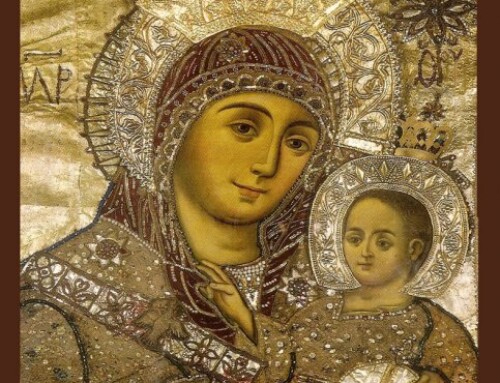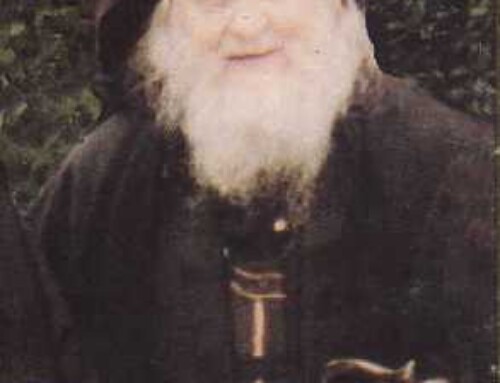Word Magazine May 1958 Page 6
THE IMPORTANCE OF CHURCH WORSHIP
By Father Ignatius H. D. Preston, Springfield, Illinois
The Orthodox Catholic Church requires that the faithful attend the Divine Liturgy every Sunday, and on Holy Days, unless there is a grave and valid reason for not doing so. Such a requirement should not be necessary when one considers what the Divine Liturgy, the highest act of worship of the Church had so vital a meaning to our forefathers, that in the times of persecution they worshipped in catacombs, and in other secret gatherings even at the peril of their lives. Yet today in our country, where we enjoy the freedom of religious worship, many of our people show the utmost indifference and neglect. The forefathers of many of these same people suffered torture, and shed their blood for the faith at the hands of the infidel.
It is distressing to see so many who have been baptized and sealed with the Gift of the Holy Spirit in the Orthodox Catholic Church, enter into strange places to worship with those who deny, and even ridicule, the teachings and practices of the Church that was founded by our Lord and God and Saviour, Jesus Christ. Indeed, there are many who would not think of accepting a substitute for the genuine in things pertaining to the secular world, but they will accept a substitute in their religious life, not realizing that the substitute is endangering the salvation of their souls.
If those of our people who are so indifferent to the practice of our Holy Religion could catch only a glimpse of the eternal beauty and meaning of the Divine Liturgy, and realize, even in part, the sublime meaning of the drama of the salvation of mankind that takes place before their eyes, there would come to them that peace of soul and quickening of the spirit that is experienced in the true worship of God. In the Divine Liturgy we see unfolded before us the eternal plan of God for the salvation of the world. In this sublime service we see the prophecies and rites of the Old Covenant fulfilled: the Forerunner fulfilling his mission, the Son of God becoming incarnate, His suffering and death, His mighty resurrection, His glorious ascension, and the descent of the Holy Spirit. Although the Divine Liturgy is often spoken of as a drama, it is a reality; for our Lord is sacramentally present upon the Altar, and we here show forth His death as St. Paul says, until His coming again.
As we take part in the Divine Liturgy, exercising the priesthood of the laity, we grow in grace, and in the knowledge and love of God in Jesus Christ, and our worship here on earth unites us with those blessed ones, who, having washed their robes in the blood of the Lamb, stand before the throne of God praising him continually unto the ages of ages.
When the cares of this world press heavily upon us, and fears and anxieties surround us, leaving us lonely and depressed, we find our spirits lifted up as we worship with the faithful who share with us the vicissitudes of life. We enter that realm of true and eternal reality which transcends this material and transitory life, and we go forth filled with new hope and strength to continue our pilgrimage on life’s journey.
It is unfortunate that so many of our people have not been trained in childhood, to realize the importance of being regular and on time in their attendance at the services of the Church. If we were invited to some social function or had an important business appointment, not one of us would think of being late, yet how many of us come before the presence of our Lord in His Holy Temple when the Divine Liturgy is nearly over. We lay much emphasis on the preparation and education of our children for their welfare and success in the material world: yet how much more important it is that they be trained to grow in their spiritual life in the Church, that they may enter into their eternal heritage, which through our Lord’s redemption, is the true destiny of mankind. There are also others who give us business or social engagements a place of more importance than the worship of their Creator and Redeemer, and leave the Holy Temple while the services are still going on.
If our people only realized the meaning of the Holy Sacrifice of the Mass, or the Divine Liturgy, which is the name that has been handed down through the centuries by the Holy Eastern Orthodox Catholic and Apostolic Church, they would not be found entering non-Orthodox places of worship, and joining with them in their services. Instead, they would be found taking part in the highest act of worship which our Lord himself instituted, and is continued by His command in the Orthodox Catholic Church until His coming again. Our Lord is truly with us in His Sacramental Presence upon the Altar as we join with the priest in the offering of the Holy Sacrifice for the living and the dead. What a great privilege, and what a sacred responsibility we have as Orthodox Catholic Christians. However, many of our people will attend Protestant services where the Holy Sacrifice of the Mass, the devotion to Blessed Mary ever Virgin Mother of God Most Holy, and the invocation of the Saints, have not only been denied, but cast out. These beliefs and practices of the Church of the living God, the pillar and ground of truth, have, under the guidance of the Holy Spirit been preserved down through the ages. How many sell their birthright for a mess of pottage as Esau did of old!
It is indeed easy to criticize the faithful for their laxity and indifference in the practice of their religion, but unless they are moved to the realization of what they are losing by their laxity and indifference, the criticism is of no avail. There are those who through pride harden their hearts, when they are admonished for neglecting their duty, but there are also those who are awakened to their high calling as Orthodox Catholic Christians, and exercise their religious duties, and become not only fervent themselves in the practice of their religion, but by example and precept are an inspiration to others.
May God grant that our pastors, Church school teachers, and parents, will exercise greater zeal in instructing our children in the beliefs and practices of our Holy religion, so that they may have a solid foundation that will enable them to grow in grace, and in the knowledge and love of God in Jesus Christ.


